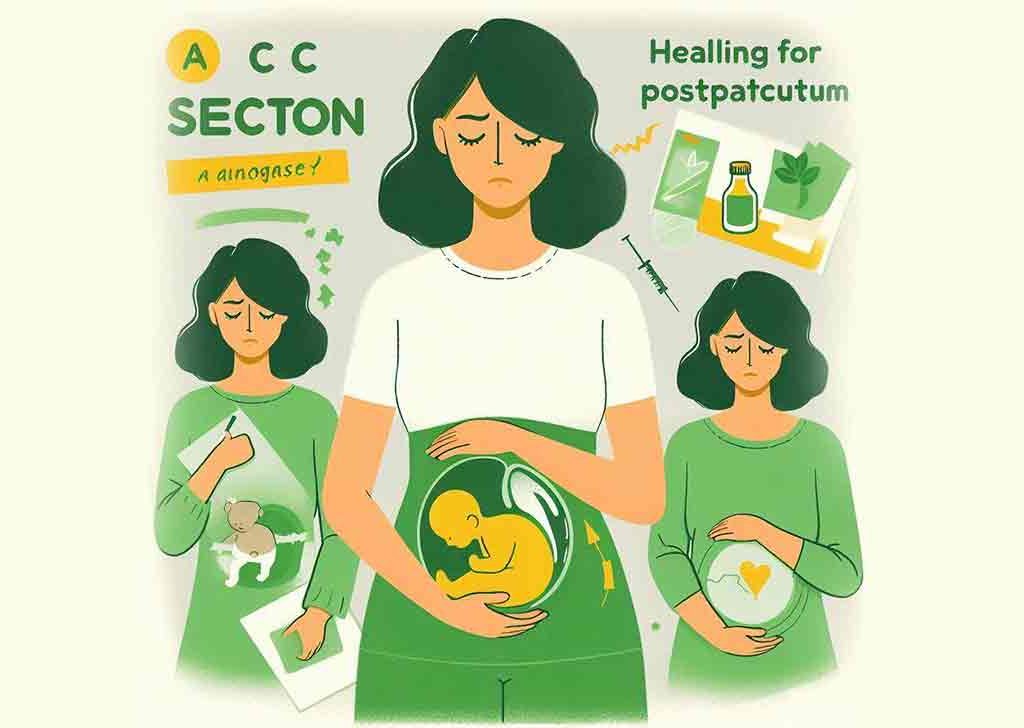8 Items You Shouldn’t Forget on Your C-Section Shelf
8 Items You Shouldn’t Forget on Your C-Section Shelf, it’s essential to have a well-stocked shelf or space dedicated to your recovery needs. The right supplies can make a significant difference in ensuring comfort, convenience, and a smoother healing process. Below are 8 essential items you shouldn’t forget to include on your C-section shelf: 1. Postpartum Abdominal Binder 2. Pain Relief Medications 3. High-Waisted, Loose-Fitting Underwear 4. Antibacterial Wipes and Peri Bottle 5. Compression Socks 6. Nursing-Friendly Nightgowns or Robes 7. Healthy Snacks and Water Bottle 8. Pillows for Support Conclusion: Having these eight essential items on your C-section shelf can significantly enhance your comfort and recovery process. From pain management to proper support and hygiene, ensuring your recovery space is well-equipped will allow you to focus on healing and bonding with your new baby. C-Section Shelf When preparing for a C-section recovery, it’s essential to have a well-stocked shelf or space dedicated to your recovery needs. The right supplies can make a significant difference in ensuring comfort, convenience, and a smoother healing process. Below are 8 essential items you shouldn’t forget to include on your C-section shelf: 1. Postpartum Abdominal Binder 2. Pain Relief Medications 3. High-Waisted, Loose-Fitting Underwear 4. Antibacterial Wipes and Peri Bottle 5. Compression Socks 6. Nursing-Friendly Nightgowns or Robes 7. Healthy Snacks and Water Bottle 8. Pillows for Support Conclusion: Having these eight essential items on your C-section shelf can significantly enhance your comfort and recovery process. From pain management to proper support and hygiene, ensuring your recovery space is well-equipped will allow you to focus on healing and bonding with your new baby. C-Section Shelf A C-section shelf refers to the small bulge or “shelf” of skin and tissue that sometimes develops at or just above the C-section incision site. This is a common post-surgery issue experienced by many women after a C-section and occurs due to several factors. Here’s a detailed explanation of what the C-section shelf is, why it happens, and how to manage or reduce it: What is a C-Section Shelf? The C-section shelf is the area where the lower abdomen protrudes or hangs over the incision scar after healing. This bulge occurs for a variety of reasons, including: Why Does the C-Section Shelf Happen? 1. Scar Tissue and Healing Process 2. Postpartum Changes in Skin Elasticity 3. Fluid Retention and Swelling 4. Abdominal Muscle Weakness How to Reduce or Manage the C-Section Shelf While it’s not always possible to completely eliminate a C-section shelf, there are several steps that can help reduce its appearance or manage discomfort: 1. Gentle Core Exercises 2. Postpartum Abdominal Binder 3. Massage and Scar Mobilization 4. Healthy Diet and Hydration 5. Skin Care Routine 6. Consult a Physical Therapist or Specialist 7. Surgical Interventions (If Needed) 8. Patience and Self-Compassion Emotional Impact and Body Image It’s also important to acknowledge that the C-section shelf can have an emotional impact on some women. After childbirth, many new mothers struggle with changes in their body and may feel self-conscious about scars or changes in their abdomen. Here are a few considerations for coping with these emotional challenges: 1. Acceptance and Positive Body Image 2. Support Networks 3. Consulting a Professional Conclusion The C-section shelf is a common post-surgical outcome for many women, caused by factors such as scar tissue formation, excess skin, and muscle weakness. While it may be frustrating, there are several ways to manage and potentially reduce its appearance, including physical therapy, scar care, proper hydration, and core-strengthening exercises. In more severe cases, surgical options may be considered. The key to recovery and managing the emotional aspect of the C-section shelf is patience, self-compassion, and focusing on overall health and well-being during the postpartum period. It’s normal to take time to process the emotions after a C-section. Many women experience anger, but it’s important to work through these feelings. It’s natural to feel a range of emotions after a C-section, and it’s okay to take time to process and heal. Having a C-section can be a significant and emotional experience for many women. It’s common for feelings of anger to arise, and it’s important to acknowledge and address these emotions. Taking the time to work through these feelings can be crucial for emotional healing and overall well-being. It’s important to remember that every woman’s journey is unique, and it’s okay to seek support and guidance during this process. By addressing and working through these emotions, many women find a sense of closure and peace regarding their C-section experience. I Had A C Section The Emotional Aftermath Of C-sections Recovering from a C-section can be an emotional journey. It’s not uncommon to feel anger or disappointment about the experience. For some, it takes time to come to terms with the reality of having had a C-section. Physical And Psychological Impacts C-sections are a common procedure, but they can have a lasting impact on a new mother. The physical effects of a C-section can be painful and long-lasting, and the psychological impact can be just as significant. Some women may feel a sense of disappointment or even failure for not being able to deliver vaginally. Others may feel disconnected from their baby or struggle with postpartum depression. The recovery time can also be longer, and new mothers may have trouble adjusting to their new role as a parent while also dealing with the physical and emotional aftermath of surgery. Why Postpartum Anger Emerges Postpartum anger is a common experience among new mothers, but it can be particularly intense for those who have had a C-section. The physical pain and discomfort associated with the procedure can make it difficult to bond with the baby or enjoy the early days of motherhood. Additionally, the feeling of being out of control during the surgery can lead to feelings of anger, frustration, and even resentment towards the medical professionals involved. It’s important for new mothers to acknowledge these feelings and seek support from loved ones or a mental health professional.
8 Items You Shouldn’t Forget on Your C-Section Shelf Read More »










